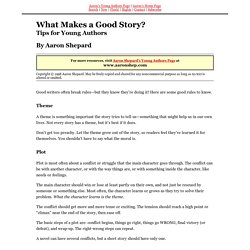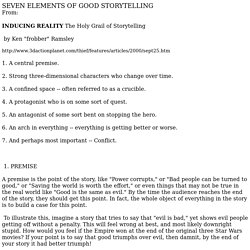

Unmissable articles on writing. Book Marketing Tips and Strategies for Authors. WRITING HABITS, Jason Bond. What Makes a Good Story? (Tips for Young Authors) Good writers often break rules—but they know they’re doing it!

Here are some good rules to know. Theme A theme is something important the story tries to tell us—something that might help us in our own lives. Not every story has a theme, but it’s best if it does. Don’t get too preachy. Plot Plot is most often about a conflict or struggle that the main character goes through. The main character should win or lose at least partly on their own, and not just be rescued by someone or something else. The conflict should get more and more tense or exciting. The basic steps of a plot are: conflict begins, things go right, things go WRONG, final victory (or defeat), and wrap-up. A novel can have several conflicts, but a short story should have only one. Story Structure At the beginning, jump right into the action. Decide about writing the story either in “first person” or in “third person.” Elements. SEVEN ELEMENTS OF GOOD STORYTELLING. From: INDUCING REALITY The Holy Grail of Storytelling by Ken "frobber" Ramsley 1.

A central premise. 2. 3. 4. 5. 6. 7. A premise is the point of the story, like "Power corrupts," or "Bad people can be turned to good," or "Saving the world is worth the effort," or even things that may not be true in the real world like "Good is the same as evil. " To illustrate this, imagine a story that tries to say that "evil is bad," yet shows evil people getting off without a penalty. Many stories have more than one part to the premise, for example, "power corrupts, but goodness can redeem the corrupted" -- in fact, this very combination is perhaps what makes the first Star Wars movies so satisfying. Characters have their own premises as well -- mainly in the from of what they believe about themselves, even if it's not entirely true. YOUTH WRITING TECHNIQUE. A Fuse #8 Production — @fuseeight A School Library Journal Blog. Fuse 8 is home to NYLIB top 100 books, includes newly published.
Peter Mayle. BIG MAGIC by Elizabeth Gilbert Availble Now! Wordherders. Chuck Sambuchino’s Guide To Literary Agents Blog. When your submission materials – a query letter, synopsis, manuscript, or book proposal – arrive in an agent’s inbox, they land among hundreds of others.

Authors who get rejected tend to fall in one of two categories when submitting materials: they try too hard, or not enough. This Oct 26 Writer’s Digest Boot Camp,... Until further notice, they are only soliciting new romance clients for their team. For all other genres, Laurie and Tricia are closed to new submissions unless met at conferences or online events. This is a recurring column I’m calling “7 Things I’ve Learned So Far,” where writers (this installment written by Francesca Zappia, author of MADE YOU UP) at any stage of their career can talk about writing advice and instruction as well as how they possibly got their book agent — by sharing seven things they’ve learned along their writing journey... Congratulations! Welcome to the 19th (free!) **GIVEAWAY! **GIVEAWAY! Conflict, as we all know, is the lifeblood of a story. 3. Competitions. Writer’s Digest’s Self-Published Book Awards is currently accepting entries.

This is the only Writer’s Digest competition exclusively for self-published books. Writer’s Digest’s oldest and most popular competition, the Annual Writing Competition, is currently accepting entries. Winners will be announced in our December 2017 issue. Annual Writing Competition. Want to manage your competitions account?

Log In Here CLOSED-87th Annual competition open October 2017 Writer’s Digest has been shining a spotlight on up and coming writers in all genres through its Annual Writing Competition for more than 80 years. Enter our 86th Annual Writing Competition for your chance to win and have your work be seen by editors and agents! Almost 500 winners will be chosen. Already Entered? PrizesOne Grand Prize winner will receive: An announcement of the winner on the cover of Writer’s Digest (subscriber issues only)$5,000 in cashAn interview with the author in Writer’s DigestOne on one attention from four editors or agentsA paid trip to the ever-popular Writer’s Digest Conference! Write Better, Get Published, Be Creative. Creative Writing Prompts. Write a scene that includes a character speaking a different language, speaking in a thick accent, or otherwise speaking in a way that is unintelligibe to the other characters.

(Note: You don't necessarily need to know the language the character is speaking—be creative with it!) Describe a character's reaction to something without explaining what it is. See if your fellow prompt responders can guess what it is. Write a story or a scene about one character playing a prank on another. Describe the scene from both characters' points of view. Writing Prompt: Write a story that involves confusion over homonyms (words that have the same spelling but different meanings) or homophones (words that sound the same but are spelled differently).